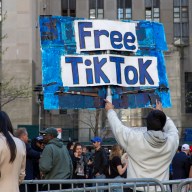FAMOUS AIMLESS: Reality TV fame is probably up there with being closely related to a mass murderer or being the parent of sextuplets in terms of desirability – you’re definitely going to be in the public eye for awhile, though you might find yourself dreaming about blessed normalcy the longer it lasts.
Last week, New York magazine ran an article on the winners and top contestants who get their tickets to fame from shows on the U.S. Bravo network like Project Runway and Top Chef. The piece led off with Jay McCarroll, winner of the first season of the former show, who describes himself as homeless two years after being dubbed “America’s Next Top Designer.” That he made this statement in his Manhattan workspace was the first clue that the word “homeless” was being thrown around in a cavalier fashion; a few days later, McCarroll and his publicist had issued a public statement denying that he was anywhere near living on the streets, claiming that he had an apartment at 72nd Street and Riverside Drive. McCarroll went on to mock the New York article with a YouTube video that showed him parading around New York with a “Will Design For Food” sign.
The magazine is sticking with the substance of their interview with McCarroll, which had him tell the article’s writer that “I haven’t been living anywhere for two years.” To a disinterested observer, it looks like both McCarroll and the magazine latched on to the word “homeless” for impact, despite the fact that the reality – McCarroll holding the lease on a live/work space with what looks like a comfy couch amidst the clothing racks and sewing machines – bears little resemblance to the word’s actual meaning.
The point of the piece was that few of the contestants on Bravo’s reality shows have had their careers skyrocket in the aftermath of the shows, and that the network’s contracts for contestants have a lot to do with this. In McCarroll’s case, it seems that both sides are to blame; the network did little to promote the Project Runway winner after he won, despite clauses in the contract stating that they have exclusive rights to contestants for a year after the season ends, own the work produced during the season, and that, if they accept the US $100,000 prize money, the show’s producers have a 10 per cent stake in the winner’s brand in perpetuity. McCarroll famously declined the prize money to escape what amounted to financial indentured servitude, and the bad press apparently convinced the producers, the Weinstein Company, to drop the clause.
McCarroll, for his part, sounds like was ultimately as naive behind the cameras as he was entertaining in front of them. “You don’t think I took the fucking bus to New York the day after I won the show, thinking someone was going to come up to me on the street and say, You’re awesome, here’s money?” he told New York. “I thought that for two years. But I’ve given up on that.” Season two Project Runway contestant Andrae Gonzalo sums it up by saying “I am now a famous fashion designer. But that is so different from a successful fashion designer,” which is pretty much the distilled essence of reality TV fame in a nutshell.
















